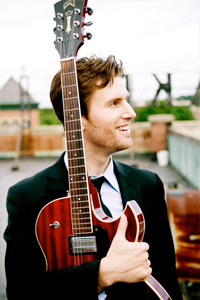
Mark Wilson
Nick Grondin
Position
Assistant Professor
Affiliated Departments
Telephone
617-747-6434
Personal Websites
For media inquiries, please contact Media Relations
Career Highlights
- Sings and plays guitar, lap steel, bass, piano, drums, harmonica, and mandolin
- Leader of Nick Grondin Group and Nick Grondin Jazz Orchestra
- Member of Public Domain and Jazz Composers' Collective Quintet
- Has performed with Joshua Redman, Bob Moses, and Il Divo at the Panama Jazz Festival
- Recordings inculde SongTeller by The Jazz Orchestra Project (2009)
- Teaching Fellow in Jazz Harmony and Jazz Improvisation at Harvard University
- BMI Jazz Composers’ Workshop (2009-2011) with Jim McNeely and Mike Holober
Awards
- DownBeat Student Music Awards for Best Extended Jazz Composition and Arrangement (2007, 2008)
- Received three ASCAP Young Jazz Composer Awards (2008, 2009, 2011)
Education
-
School NameNew England Conservatory of MusicDegreeDoctor of Musical Arts (DMA)Field of StudyJazz PerformanceDate Degree Received
-
School NameNew England Conservatory of MusicDegreeMaster of Music (MM)Field of StudyJazz CompositionDate Degree Received
-
School NameMacalester CollegeState or ProvinceMinnesotaDegreeBachelor of Arts (BA)Field of StudyMusicDate Degree Received
In Their Own Words
